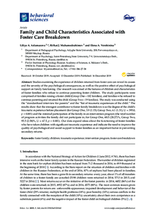Abstract: Studies examining the experience of children returned from foster care can reveal its causes and the severity of the psychological consequences, as well as the positive effect of psychological support on family functioning. Our research was aimed at the features of children and characteristics of foster families who refuse to continue parenting foster children. The study participants were comprised of families raising a foster child (Group One—182 families), and families who refused to continue parenting and returned the child (Group Two—19 families). The study was conducted using the “standardized interview for parents” and the “list of traumatic experiences of the child.” The results show that the strongest contributor to foster family breakdown was the degree of the child’s traumatic experience before placement (for Group One, 3.9 (1.15); Group Two, 6.1 (1.31), U = 395.0, p < 0.001) and the minimal participation of the family in an intervention program (the total number of program activities the family did not participate in; for Group One, 48.5 (28.27)%, Group Two, 95.5 (2.58)%, U = 67.5, p < 0.001). Our data expand ideas about the functioning of foster families who have taken children with significant traumatic experience and indicate the need to improve the quality of psychological and social support to foster families as an important factor in preventing secondary returns.

